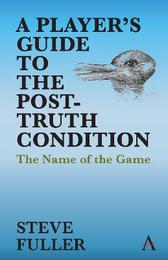
|
A Player's Guide to the Post-Truth Condition: The Name of the Game
Paperback / softback
Main Details
| Title |
A Player's Guide to the Post-Truth Condition: The Name of the Game
|
| Authors and Contributors |
By (author) Steve Fuller
|
| Series | Key Issues in Modern Sociology |
|---|
| Physical Properties |
| Format:Paperback / softback | | Pages:140 | | Dimensions(mm): Height 216,Width 140 |
|
| Category/Genre | Social and political philosophy |
|---|
| ISBN/Barcode |
9781785276040
|
| Classifications | Dewey:121 |
|---|
| Audience | | Professional & Vocational | |
|---|
|
Publishing Details |
| Publisher |
Anthem Press
|
| Imprint |
Anthem Press
|
| Publication Date |
20 November 2020 |
| Publication Country |
United Kingdom
|
Description
A Player's Guide to the Post-Truth Condition: The Name of the Game presents sixteen short, readable chapters designed to leverage our post-truth condition's deep historical and philosophical roots into opportunities for unprecedented innovation and change. Fuller offers a bracing, proactive and hopeful vision against the tendency to demonize post-truth as the realm of 'fake news' and 'bullshit'. Where others see threats to the established order, Fuller sees opportunities to overturn it. This theme is pursued across many domains, including politics, religion, the economy, the law, public relations, journalism, the performing arts and academia, not least academic science. The red thread running through Fuller's treatment is that these domains are games that cannot be easily won unless one can determine the terms of engagement, which is to say, the 'name of the game'. This involves the exercise of 'modal power', which is the capacity to manipulate what people think is possible. Once the 'necessarily' true appears to be only 'contingently' so, then the future suddenly becomes a more open space for action. This was what frightened Plato about the alternative realities persuasively portrayed by playwrights in ancient Athens. Nevertheless, Fuller believes that it should be embraced by denizens of today's post-truth condition.
Author Biography
Steve Fuller is Auguste Comte Professor of Social Epistemology at the University of Warwick, UK.
Reviews"Steve Fuller uses the concept of gaming to understand the nature of post-truth and asserts that one outcome of the post-truth condition is the gamification of reality. He offers an original, wide-ranging and precise analysis of current post truth conditions, which enables the marketization of everything and replaces politics with performance and public relations."-Gareth Thompson, London College of Communication, University of the Arts London; Author of Post-Truth Public Relations: Communication in an Era of Digital Disinformation Steve Fuller's Post Truth: Knowledge as a Power Game presented a serious challenge to current conceptions of objectivity, the autonomy of science, and the role of higher education. In A Player's Guide to the Post-Truth Condition, he raises the ante. Bringing his ideas about 'Protscience' to bear on social justice movements, Covid-19 and Breitbart through a meditation on facts and values from Plato to Popper and beyond, the reader is confronted with inevitable existential decisions about what she values most."-Sharon Rider, Professor of Logic and Metaphysics, University of Uppsala, Sweden "Fuller's breadth of scope is stunning and his authenticity as a player unquestionable. He's nailed the post-truth anti-regime as having a democratic heart at odds with monopoly licenses that experts granted themselves and does so in full awareness that new fields of play must be duly constituted."-Fred D'Agostino, Professor Emeritus of Humanities, Institute for Advanced Studies in the Humanities, University of Queensland, Australia "Fuller undertakes a fresh positive critique of the post-truth condition in the Hegelian sense of grasping the 'rational grain' of the post-truth as a reality worthy of explanation - not a pure obstacle that has to be denied, overcome or ignored. The post-truth questions both the 'one' way and the 'many' ways to truth. The whole book serves as a 'guide for an advanced user', i.e. an instruction for those who resist using any instructions and choose the game of their own." -Ilya Kasavin, Chair, Department of Social Epistemology, Institute of Philosophy, Russian Academy of Sciences
|